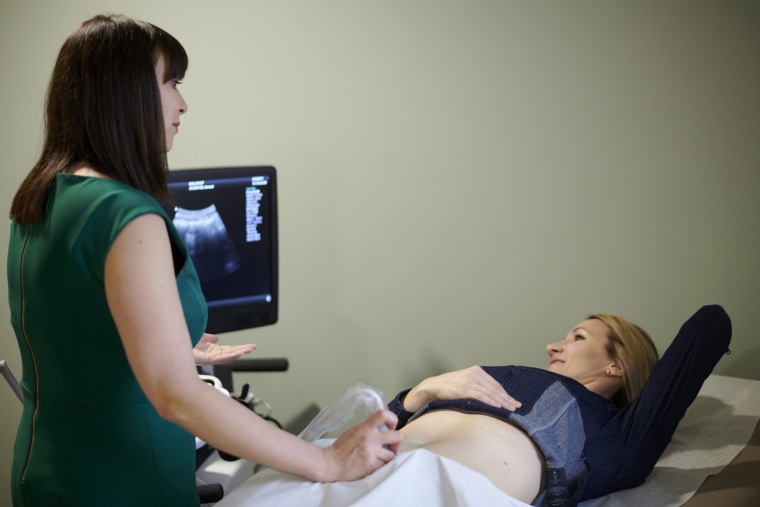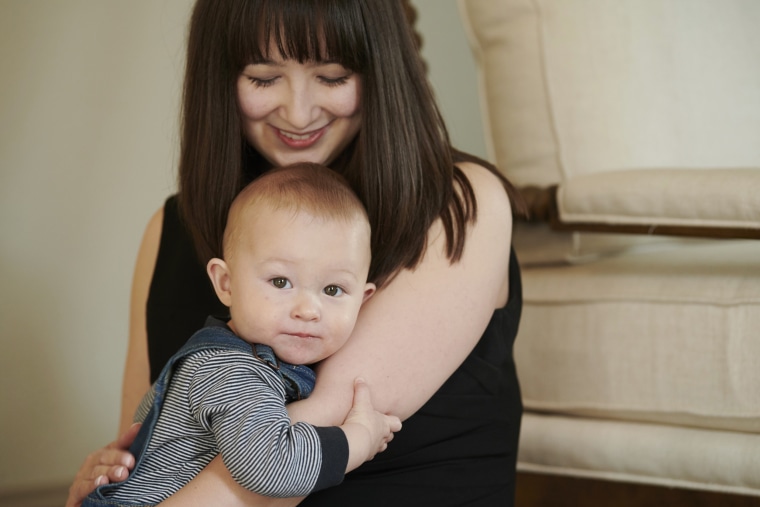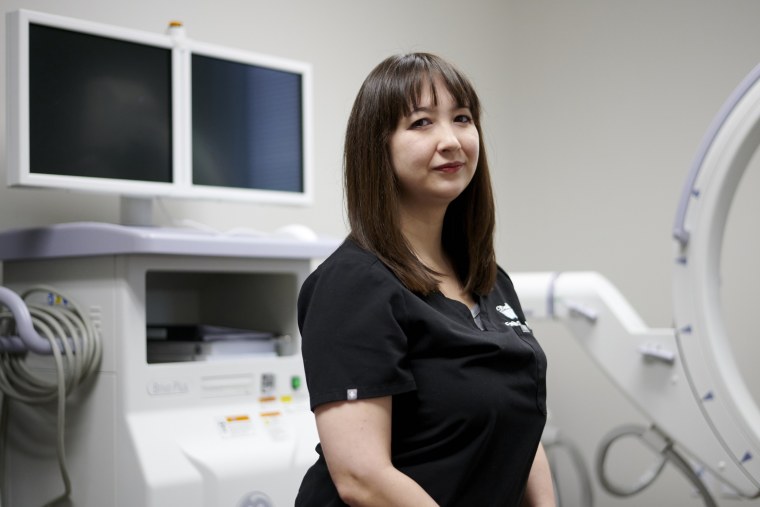Dr. Emily Goulet decided to freeze her eggs just before she turned 34. Goulet, a Dallas infertility specialist, now 37, knew that the chances of getting pregnant start to decline when women hit their mid- to late-30s, and she wanted to increase her odds of giving birth to a child of her own before it was too late.
So she froze some eggs, with plans to freeze more later. But then she saw patients around the same age struggling to conceive — even after numerous rounds of in vitro fertilization — and the reality of how difficult it can be to get pregnant hit her hard. Though she had yet to meet a partner, Goulet decided to fast-forward her plans and start IVF when she turned 35.
While IVF does not always result in pregnancy, Goulet hoped her age and good health would work in her favor. Still, she was cautious; in consultations with patients, she makes clear that egg freezing is not an insurance policy for fertility — and she did not think of her own frozen eggs as a guarantee to having a baby.
“I realized this was a good moment for me to do what I can, knowing it wasn’t 100 percent,” she said.
In the past decade, egg freezing has undergone major technological improvements: a more reliable cooling method; better analysis of embryos prior to being implanted; more effective medications to stimulate the ovaries before retrieving eggs; and more.
But Goulet and other experts are raising concerns that the technology, while constantly evolving, may not be keeping up with expectations of the women turning to it, especially as more patients than ever freeze their eggs in the United States: In 2009, only 475 women froze their eggs, according to the Society for Assisted Reproductive Technology, while in 2016, that number climbed to almost 7,300.
“If you win, you get the best payout ever: You get a child. But if you don’t win, you feel scammed.”
“It’s an expensive lottery ticket,” Goulet said. “If you win, you get the best payout ever: You get a child. But if you don’t win, you feel scammed.”
Goulet did ultimately get her payout — almost two years after she started IVF. But it took seven grueling rounds of different kinds of IVF hormone shots, at a cost of tens of thousands of dollars. And that included multiple canceled IVF cycles — attempts at fertilization or egg retrieval that had to be scrapped because they were likely to lead to poor outcomes.

“That to me was the most devastating, when I could not even get past the start line,” she said.
Considered “experimental” by the American Society for Reproductive Medicine until 2012, egg freezing is now an approved technology. But it is not a fail-safe way to preserve fertility.
“One of the fantasies is that when a woman is ready to have a child, that science will make it possible for them.”
“One of the fantasies is that when a woman is ready to have a child, that science will make it possible for them,” said Tanya Selvaratnam, an activist and author of “The Big Lie: Motherhood, Feminism, and the Reality of the Biological Clock.” “The reality is that it won’t work out for every woman.”
Selvaratnam turned to IVF following multiple miscarriages, but was unable to undergo fertility treatments due to an unexpected medical issue. She fears patients’ expectations for frozen eggs are already unrealistically high and will become even more inflated now that egg freezing is offered at more clinics than ever, including at pop-up boutique clinics that specifically target a younger generation.
“There isn’t enough oversight and regulation of their marketing practices,” Selvaratnam said. “It makes egg freezing seem like an extracurricular, almost like a cosmetic procedure, and not an invasive biological procedure.”
THE ODDS OF SUCCESS
Experts say it is critical to educate women who are considering freezing their eggs about potential risks and costs.
They add that those freezing their eggs electively — meaning for “social” reasons such as delaying child-bearing due to career considerations or because they have not yet met a partner — should be given an idea of what their chances of success are when they thaw the eggs.
But because elective egg freezing (as opposed to freezing for medical reasons, such as preserving fertility ahead of cancer treatment) is still relatively new, statistics on it are elusive.
At the Yale Fertility Center in New Haven, Connecticut, director Dr. Pasquale Patrizio tells patients he cannot provide them with a detailed estimate of their chances of success, given that many electively frozen eggs are still in storage and data on them has yet to be collected. But, he said, that does not generally deter women.
“The success rate is very important, but it’s not the entire story,” he said. Women should also consider how long they plan to store their eggs for and consequently how much they might end up paying in annual storage fees, Patrizio added, and they should be aware of the small risk of developing ovarian hyperstimulation syndrome, a condition that can result from hormonal injections that may require hospitalization in severe cases.
Still, doctors acknowledge having more information on success rates would be helpful.
The data that does exist is not overwhelmingly positive. According to the latest statistics from the Centers for Disease Control and Prevention, only 21 percent of cycles among patients using their own frozen eggs ultimately ended in live births. The Society for Assisted Reproductive Technology, which uses a slightly different metric than the CDC, showed odds that top out around 11 percent, depending on age.
Other numbers are more promising: Last year, Dr. Randi Goldman, an attending physician at Northwell Health Fertility in Manhasset, New York, and an assistant professor at the school of medicine at Hofstra University/Northwell, was among researchers who published what they believe to be the first study to use a mathematical model to predict a woman’s chances of giving birth from eggs she has frozen.
Their calculator determines probability based on age — older women have lower chances — and the number of eggs she has frozen, with more eggs improving the odds.
The calculator predicts, for example, that a 35-year-old who freezes 10 mature eggs has a 69 percent chance of at least one live birth. At age 36, the chances drop to 60 percent. By age 40, the chances with the same number of eggs is down to 30 percent.
“Unfortunately, no matter how many eggs a woman retrieves, there’s no guarantee of a live birth in the future.”
It’s a numbers game that ultimately boils down to reminding patients that egg freezing can only do so much for fertility, Goldman said.
“Unfortunately, no matter how many eggs a woman retrieves, there’s no guarantee of a live birth in the future,” she said. “Being upfront about that is hugely important.”
‘STANDARD PROTOCOL’ IN EGG FREEZING
In an informal survey recently conducted by NBC News, many respondents said they are contemplating freezing their eggs, or wish they had done so.
The main concern among the approximately 150 people who responded was cost: Depending on how long you are keeping the eggs, the price can run upwards of $20,000 between egg retrieval fees, hormone treatments, annual storage, and IVF using the thawed eggs. And typically, it is not covered by insurance (though some companies have started to pay for employees to freeze their eggs).
While using thawed eggs can be a crapshoot, the technology involved in freezing them has advanced considerably in recent years. The two clinics that one year ago suffered high-profile freezer malfunctions were a rare occurrence, according to experts, and while freezer tanks are not physically staffed round-the-clock, all should have 24/7 monitoring that alerts staff through a telephone chain to deviations in temperature.
In the past decade, the biggest change with egg freezing has been how they are actually frozen.
Eggs used to be cooled using a slow-freezing technology in which a computer-programmed machine would gradually drop the temperature.
That method wasn’t “tremendously efficacious,” according to Catherine Racowsky, director of the In Vitro Fertilization Lab at Brigham and Women’s Hospital in Boston and president-elect of the American Society for Reproductive Medicine. This was because the water in the cells would crystallize, immediately causing degeneration of the eggs, rendering some unusable upon thawing.
Now labs use vitrification, a process that drops the temperature of the eggs almost instantaneously.
Racowsky calls vitrification a “pretty standard protocol” that all clinics should be employing because it protects the eggs better. While many clinics now boast a 95 percent thaw success rate, there are still obstacles.
“We’re good at freezing them in terms of getting good survival [when they’re thawed], but eggs are pretty complicated, and it’s clear that we need to do more work,” she said.

Goulet, the Dallas reproductive endocrinology and infertility specialist who finally got pregnant from her frozen eggs after multiple tries, is grateful every day for her 10-month-old, a boy named Charlie whom she is raising as a single mother. Charlie is crawling and standing on his own now, and starting to show his personality.
“He is my motivation,” Goulet said. “Even those mornings when I wake up at 5:45 and I want to sleep five more minutes, I say, ‘No, I need to get out there and help other women have a baby like him.’”




